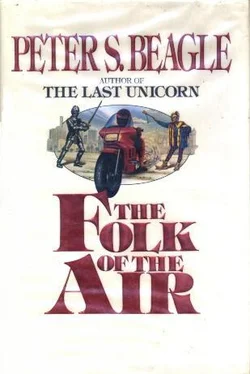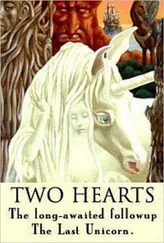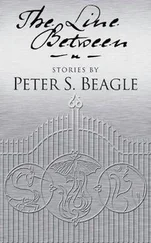“I don’t know,” Farrell said. “I never knew any before.” The room might have been the parlor of a country inn, without the moose head and the piano; there were a couple of bookcases, a couple of dusty steel engravings, a worn but genuine Turkish rug, wallpaper patterned with sepia mermaids and gray sailors. Farrell asked, “What place is this? Where are we now?”
“This is a room where I was quite happy once,” she said. “Not the same room, of course, that one is gone, but I made it again, as well as I could, for myself. Sometimes this is all I have.”
“It’s not part of the house,” Farrell said.
Her quick headshake ended as a shrug. “Well, it is and then it isn’t. It is not exactly in the same place as my house, but it is as much a part of the house as anything else is. Only it is hard to find, even for me. I have spent weeks this last time trying to remember the way back. Briseis was really very clever, and you, too.”
“Has Ben ever been here?” She did not answer, and Farrell moved toward the two windows on either side of the still life of apples and wine bottles. Behind him, Sia said, “Be careful. Those windows are my eyes, in a way, and I cannot protect you from seeing what I see. Maybe you should not look out.”
There was a castle on the hot, shivering horizon, very far away across wide fields of barley and corn, bounded and traversed by yellow oxcart ruts. The castle was transparent at that distance and looked like sharp soap bubbles. Farrell stepped back, blinking, and the vision vanished, to be replaced by a flowering amber city whose structures made Farrell dizzy and cold to see; and in turn by a tiny three-cornered house tipped far out over a jungle river, where it shone and trembled before dawn. Fish swam through its walls.
“Oh,” he said. “How lovely.” As if his breath had scattered them, house, dawn, and river were gone, and once again he peered down on barley fields, footpaths and widecurving streams under a sky like a single pale-golden petal. He saw not castles this time, nor any great manors; and he might easily have overlooked the reed and turf thatches of the little mud-walled huts, except that, as he watched, these ruffled into fire, one after another, opening like waking birds. There were riders galloping past the huts, and men running between them with torches.
He widened his eyes until they hurt to make the scene disappear, but it became steadily more real. Where the riders had already passed, what he had taken for afternoon shadows were black and broken fields; rings of bright flowers resolved into the embers of homes; and everywhere the true shadows sheltered naked children cradling the split, spitted, riddled bodies of other children. Farrell saw a cow trudging in a widening circle of her own entrails, and he saw a woman gnawing eagerly on her arm, while an old man stared straight up into his face can he see me ? with his mouth opening wider and wider. The old man turned deliberately, then dropped his breeches and bent over, exposing speckled, caved-in buttocks to Farrell’s gaze. Turning again, his mouth closed now, he gripped his penis in both hands and urinated shakily at the empty golden sky. The wind tossed the spray back at him, and it dribbled down his cheeks, mingling with his dirty tears.
Farrell whispered, “Make it stop,” and, blessedly, the vision began slowly to dissolve. His last sight of the country far below was of a fat woman running, carrying a cat and a feather bolster in her arms. The horseman coming after her was singing a song that Farrell knew.
“Who are you?” he cried out to Sia, and heard her answer inside himself.
“I am a black stone, the size of a kitchen stove. They wash me in the stream every summer and sing over me. I am skulls and cocks, spring rain and the blood of the bull. Virgins lie with strangers in my name, the young priests throw pieces of themselves at my stone feet. I am white corn, and the wind in the corn, and the earth whereof the corn stands up, and the blind worms rolled in an oozy ball of love at the corn’s roots. I am rut and flood and honeybees. Since you ask.”
The last words were spoken aloud, and, when Farrell could look at her, she was laughing, the Sia of the first morning, pumpkin-plump and cougar-quick, her gray eyes shining with ancient havoc. But this was not the first morning, and he demanded furiously, “Who are you? To show me that and laugh—I thought you were wonderful, I thought you were like her .” Her laughter moved in the parlor floor under Farrell’s feet.
“Like the Lady Kannon? Is that what you thought, that I was a goddess of mercy with a thousand arms, to save a world with each one? No, no, the Lady Kannon really is a queen, and I really am only a black stone. That was my first nature, and I have not changed so much.” But the mockery faded from her voice as she regarded him, and she added, “Not as much as perhaps I would have liked. I am stone that has washed dishes, slept in human beds, seen too many movies, but I am still stone. Stone can never be wonderful, I’m afraid.”
“Was it real, what I saw? Where was it real?” She did not bother to reply. “There was a woman running,” he said. “You could have helped her, anyway. There were so many children.”
“I told you, I am not Kannon.” The silver ring that held her hair stirred against her cheek, glinting like a tear. She said, “What I did for your friend I did because the thing that had happened to him was against certain laws, as what you saw from my window is not. And even for that, I needed help myself, and I could not have summoned it without that girl, your Julie. I have no power beyond this house—perhaps not beyond this room now.”
Briseis whimpered and skulked close to her, clearly not daring either to push for comfort or offer it, but collapsing again within comfort’s range, just in case. Farrell said, “Well. I wish I could have seen you when you were a black stone.”
“Oh, I was certainly something.” The tone was sardonic enough, but her voice was gentle in that moment. She said, “It was nice, I think, the flutes and the smoky prayers and the screaming—a long time ago, that must have been what pleased me. I intervened everywhere, absolutely everywhere, in everything, just to be doing it, just because I could.” Her bitter chuckle prickled his skin, as his own music did. “I would have been more use to those children if I had remained all stone.”
“I don’t understand,” he said. “I don’t understand how a goddess can lose her power.”
She drew back slightly, looking at him with a kind of dangerous wonder, before she smiled. “Oh, very good. I never thought you would ever use that word. Well, with power it is the same for everyone—if you don’t want it quite enough, it just leaves you. Power always knows, you see. And gods always lose their power, because we lose our pleasure in it, we all come to want other things, sooner or later. This is where we are different from human beings.”
“What did you want?” Farrell asked. “What was it you wanted more than being a goddess?” Sia slipped the silver ring off and began slowly to unweave her thick, straggly braid, as she had done on the night she tried to bend the universe for Micah Willows. Farrell thought, It’s the opposite of that thing the Finnish sailors do. They tie up the winds with bits of string, they tie magic into knots. She’s turning it loose, and I’m watching her .
“Brush my hair, please,” she said, “Ben forgot last night. The brush is on that little table.
So Farrell stood behind her strange, flowing chair, in a room that did not exist, and he brushed her hair, as he had always wanted to do, feeling the black and gray sea-weight of it murmur and burn over his hands, feeling the freed winds stretching themselves like cats waking to hunt. Once, showing him how to use the brush correctly, she touched his face, and he remembered lying all one day in a summer meadow, watching a Monarch butterfly being born.
Читать дальше












